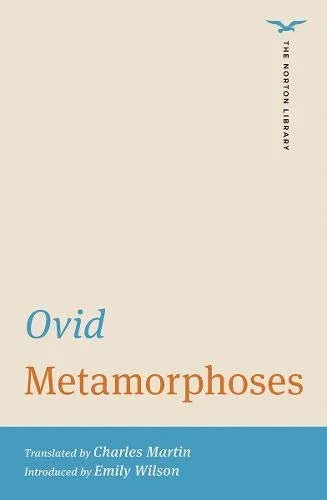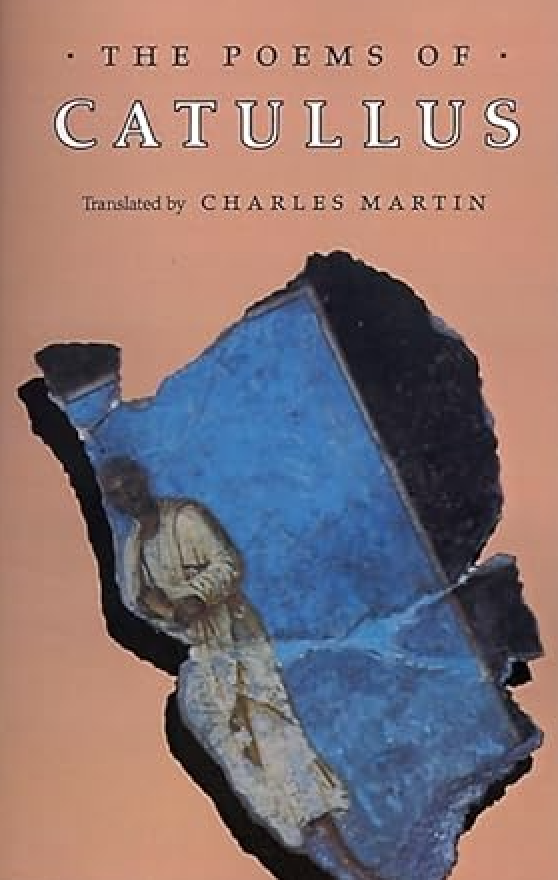Ovid Metamorphoses translated by Charles Martin, W.W. Norton
A version that has been long awaited, and likely to become the new standard. ―Michael Dirda, The Washington Post
Ovid's epic poem―whose theme of change has resonated throughout the ages―is one of the most important texts of Western imagination, an inspiration from Dante's times to the present day, when writers such as Salman Rushdie and Italo Calvino have found a living source in Ovid's work. Charles Martin combines a close fidelity to Ovid's text with verse that catches the speed and liveliness of the original. Martin's Metamorphoses will be the translation of choice for contemporary readers in English. This volume also includes endnotes and a glossary of people, places, and personifications.
THE CRITICAL EDITON: Ovid’s epic poem—whose theme of change has resonated throughout the ages—is one of the most important texts of Western imagination, an inspiration from Dante’s time to the present, when writers such as Salman Rushdie and Italo Calvino have found a living source in Ovid’s work. The text is accompanied by a preface, A Note on the Translation, and detailed explanatory annotations. “Sources and Backgrounds” includes Seneca’s inspired commentary on Ovid, Charles Martin’s essay on the ways in which pantomimic dancing—an art form popular in Ovid’s time—may have been the model for Metamorphoses, as well as related works by Virgil, Callimachus, Hesiod, and Lucretius, among others. From the enormous body of scholarly writing on Metamorphoses, Charles Martin has chosen six major interpretations by Bernard Knox, J. R. R. Mackail, Norman O. Brown, Italo Calvino, Frederick Ahl, and Diane Middlebrook. A Glossary of Persons, Places, and Personifications in the Metamorphoses and a Chronology and Selected Bibliography are also included.
THE POEMS OF CATULLUS trans. by Charles Martin, Johns Hopkins University Press
In these splendid verse translations, Charles Martin makes newly accessible the work of one of ancient Rome's most widely read and exciting poets. It is the life and language of Roman streets that gives this poetry its force and lasting appeal. Catullus is a master of passing on the latest, most vicious gossip. No blow is too low to aim at an enemy, not even the sort scratched on walls about people like "Rufa, the Bolognese wife of Menenius," whose scandalous acts in a "cheap graveyard" live on long after her. But the poet's range of experience is not limited to Roman streets. He knows of life inside Roman villas as well (including Julius Caesar's, where he was a dinner guest). And behind the boastful exaggerations there is often a serious purpose. Catullus sees himself as a morality, reminding others of what constitutes proper behavior. He is also a student of literature, and his love poems can pair moral pietites with pungent obscenities or set ancient Greek literary clichés alongside jarring, "modern" metaphors from the world of Roman high finance. Charles Martin's translation skillfully conveys the tones and rhythms of the Latin verse while never straying far from its original meaning.
CATULLUS by Charles Martin, Yale University Press
The most popular of the Roman poets, Catullus is known for the accessibility of his witty and erotic love poems. In this book Charles Martin, himself a poet, offers a deeper reading of Catullus, revealing the art and intelligence behind the seemingly spontaneous verse.
Martin considers Catullus's life, habits of composition, and the circumstances in which he worked. He places him among the modernists of his age, who created a new ironic and subjective poetics, and he shows the affinity between Catullus and the modernists of our own age. Martin offers original interpretations of Catullus's poems, viewing the love poems to "Lesbia" as a unified, artfully arranged poetic sequence, and the short poems, often dismissed as unworthy of serious critical attention, as the irreverent products of a sophisticated poetic innovator.
Unlike Horace, Virgil, and Ovid, Catullus did not influence our literary culture until the beginning of the modern era, but he is now regarded as a poet who speaks to our age with a singular directness. Pointing to Catullus's self-awareness, playfulness, and comic invention and to the elaborate complexity of his experiments in poetic form, Martin gives both the scholar and the general reader a fresh appreciation of his poetic art.
FOR THE COLLECTOR Limited Edition by Harry Duncan
The Poems of Catullus translated by Charles Martin.
Published by Abattoir Editions, University of Nebraska, Omaha, 1979
Medea translated by Charles Martin, University of Southern California Press
Renowned poet and acclaimed translator Charles Martin faithfully captures Euripides’s dramatic tone and style in this searing tale of revenge and sacrifice.
The Medea of Euripides is one of the greatest of all Greek tragedies and arguably the one with the most significance today. A barbarian woman brought to Corinth and there abandoned by her Greek husband, Medea seeks vengeance on Jason and is willing to strike out against his new wife and family—even slaughtering the sons she has born him. At its center is Medea herself, a character who refuses definition: Is she a hero, a witch, a psychopath, a goddess? All that can be said for certain is that she is a woman who has loved, has suffered, and will stop at nothing for vengeance.
In this stunning translation, poet Charles Martin captures the rhythms of Euripides’ original text through contemporary rhyme and meter that speak directly to modern readers. An introduction by classicist and poet A.E. Stallings examines the complex and multifaceted Medea in patriarchal ancient Greece. Perfect in and out of the classroom as well as for theatrical performance, this faithful translation succeeds like no other.
The Bhagavad Gita translated by Gavin Flood & Charles Martin, W.W. Norton
The Hindu scripture Bhagavad Gita ('Song of the Lord') forms part of the epic Mahabharata and comprises a dialogue between Krishna and Arjuna concerning the ethics of war and our responsibilities for performing virtuous acts in the context of our own lives. This new translation into contemporary English follows the metrical pattern of the 700 Sanskrit stanzas and is a collaboration between scholar Gavin Flood and poet Charles Martin.
The Bhagavad Gita translated by Gavin Flood & Charles Martin, W.W. Norton CRITICAL EDITION
A chance to rediscover The Bhagavad Gita in a translation that blends true scholarship with artistry. –Library Journal
The Bhagavad Gita, the “Song of the Lord,” is an ancient Hindu scripture about virtue presented as a dialogue between Krishna, an incarnation of God, and the warrior Arjuna on the eve of a great battle over succession to the throne. This new verse translation of the classic Sanskrit text combines the skills of leading Hinduist Gavin Flood with the stylistic verve of award-winning poet and translator Charles Martin. The result is a living text that remains true to the extraordinarily influential original. A devotional, literary, and philosophical work of unsurpassed beauty and relevance, The Bhagavad Gita has inspired, among others, Mahatma Gandhi, J. Robert Oppenheimer, T. S. Eliot, Christopher Isherwood, and Aldous Huxley. Its universal themes―life and death, war and peace, and sacrifice―resonate in a West increasingly interested in Eastern religious experiences and the Hindu diaspora. The text is accompanied by a full introduction and by explanatory annotations.
The volume presents seminal analogues and commentaries on The Bhagavad Gita, including central passages from The Shvetashvatara Upanishad as well as commentary spanning eleven centuries by Shankara and Ramanuja (in new translations by Gavin Flood) in addition to the writings of Bal Gangadhar Tilak and Sri Aurobindo.
Five essays by leading Hinduists discuss a wide range of issues related to The Bhagavad Gita from its roots as a religious text to its influence on the practices of yoga and transcendentalism through it ongoing global impact. Contributors include John L. Brockington, Arvind Sharma, Rudolf Otto, Eric J. Sharpe, and C. A. Bayly.








